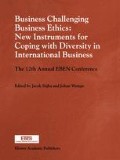Abstract
The explosion of interest in responsible corporate citizenship since 1995 has reminded many of the earlier rapid development of interest in environmental management issues. Active stakeholders and lobby groups have successfully exerted pressures on management for improved corporate behaviour. The paper looks at some recent initiatives and draws conclusions about the imprecise terminologies in use. It moves on to consider tools to better manage business risk exposures within the corporation. The example of the “Business Ethics Strategic Survey” is described, together with the attendant benefits it can deliver to company chairmen, Audit Committees and investment fund managers.
Access this chapter
Tax calculation will be finalised at checkout
Purchases are for personal use only
Preview
Unable to display preview. Download preview PDF.
References
Amnesty International: 1998, Human Rights Guidelines for Companies.
Co-operative Bank: 1998, The Partnership Report.
Council on Economic Priorities Accreditation Agency (CEPAA) New York, U.S.A.: 1997, Social Accountability 8000.
Decker, C.: 1999, P & G 99 (Harper Collins).
ECRA: 1998, An Introduction to the Ethical Consumer Magazine.
Elkington, J. and E van Dijk: 1997, Socially Challenged.
Enderle, G. and L. A. Tavis: 1998, ‘A Balanced Concept of the Firm and the Measurement of Its Long-term Planning and Performance’, Journal of Business Ethics 17, 1129–1144.
Grimshaw, Howard and Willmott: 1997, The Responsible Organisation (The Future Foundation, as commissioned by British Telecommunications plc.).
Institute of Internal Auditors: 1995, Survey of Chief Executive Officers.
Kaptein, M.: 1998, Ethics Management — Auditing and Developing the Ethical Content of Organisations (Kluwer Academic Publishers).
Kaptein, M. and J. Wempe: 1998,’ The Ethics Report: A Means of Sharing Responsibility’, Business Ethics 7(3).
Pearce, Raynard and Zadek: 1996, Social Auditing for Small Organisations (New Economic Foundation).
The Times (of London): 1997, 1998, 1999, Corporate Profiles.
Whawell, P.: 1998, ‘The Ethics of Pressure Groups’, Business Ethics 7(3).
Zaid, O. A.: 1997, ‘Could Auditing Standards be Based on Society’s Values?’, Journal of Business Ethics 16, 1185–1200.
Author information
Authors and Affiliations
Editor information
Editors and Affiliations
Rights and permissions
Copyright information
© 2000 Springer Science+Business Media Dordrecht
About this chapter
Cite this chapter
Rosthorn, J. (2000). Business Ethics Auditing — More Than a Stakeholder’s Toy. In: Sójka, J., Wempe, J. (eds) Business Challenging Business Ethics: New Instruments for Coping with Diversity in International Business. Springer, Dordrecht. https://doi.org/10.1007/978-94-011-4311-0_3
Download citation
DOI: https://doi.org/10.1007/978-94-011-4311-0_3
Publisher Name: Springer, Dordrecht
Print ISBN: 978-0-7923-6586-0
Online ISBN: 978-94-011-4311-0
eBook Packages: Springer Book Archive

